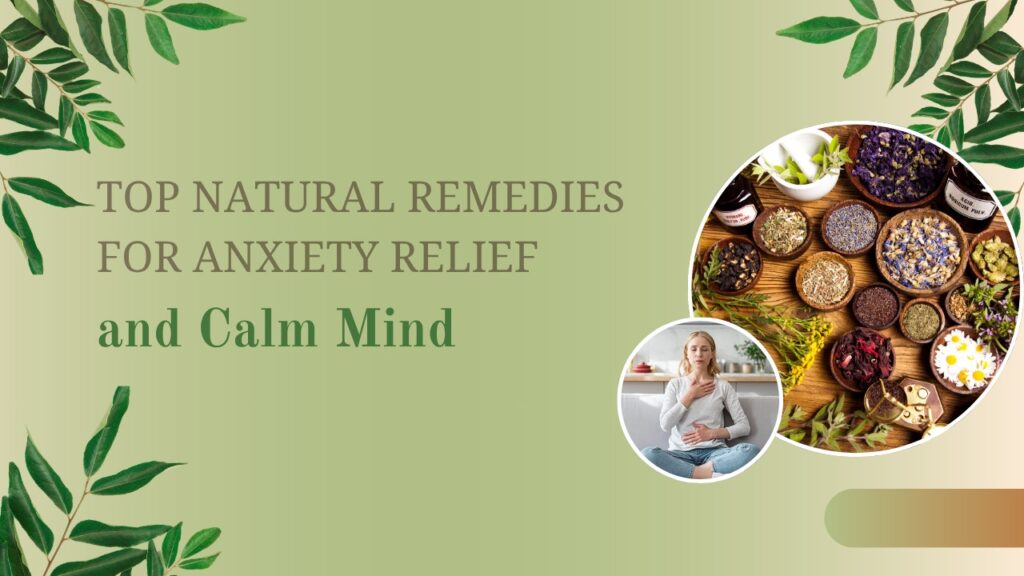Anxiety is a common mental health condition impacting millions globally. It ranges from mild unease to intense panic attacks, often disrupting daily routines, sleep, and overall well-being. Though medical treatments like therapy and medication are widely used, not everyone prefers pharmaceutical options.
Many individuals turn to natural remedies for anxiety to find relief in a gentler, more holistic way. Herbal solutions such as chamomile, lavender, and ashwagandha are known for their calming properties. Regular exercise, especially yoga or walking, also helps ease tension and improve mood by releasing endorphins.
Breathing exercises, meditation, and mindfulness practices are also effective in managing anxiety naturally. These methods help calm the nervous system, improve focus, and reduce racing thoughts. Combined with a balanced diet and adequate rest, natural remedies for anxiety can offer lasting support for mental wellness.

Top Natural Remedies For Anxiety
Chamomile Tea: The Soothing Herb for Anxiety Relief
Chamomile is one of the oldest and most trusted natural remedies for anxiety. Widely used across cultures, this gentle herb is best known for its calming properties and is commonly consumed as a soothing tea, especially during times of stress or restlessness.
Chamomile contains a powerful antioxidant called apigenin, which binds to specific receptors in the brain. This interaction helps promote a sense of calm and relaxation, making it highly effective in easing mild to moderate anxiety symptoms without the need for pharmaceuticals.
Among the many natural remedies for anxiety, chamomile stands out for its gentle yet noticeable effects. Regular use, particularly in the form of tea or supplements, can support better sleep, reduce nervous tension, and contribute to overall emotional balance. Its accessibility and safety make chamomile a popular choice for those seeking natural and non-habit-forming ways to manage stress and anxiety.
Why It Works: Chamomile has mild sedative effects that can help induce relaxation, making it a great choice for people experiencing nervousness, restlessness, or irritability. A study published in Phytomedicine found that chamomile significantly reduced anxiety symptoms in people with generalized anxiety disorder (GAD). Drinking chamomile tea before bed can also promote better sleep, which is vital for managing anxiety.
How to Use It: To reap the benefits of chamomile, simply steep a chamomile tea bag in hot water for 5 to 10 minutes. Drink it 1-2 times a day, especially in the evening, to help you unwind and manage stress. You can also take chamomile supplements if you find it difficult to drink the tea.
Lavender Essential Oil: Nature’s Calming Scent

Lavender is widely recognized for its calming scent and powerful therapeutic effects, making it a standout among natural remedies for anxiety. For centuries, it has been used to ease emotional distress and promote a sense of peace and calm.
One of the most popular uses of lavender is in essential oil form. Its soothing aroma can help reduce feelings of anxiety, stress, and even mild depression. Simply inhaling lavender oil or using it in aromatherapy can help regulate the nervous system and ease tension.
As one of the most effective natural remedies for anxiety, lavender is both versatile and gentle. Whether used in a diffuser, added to bathwater, or applied to pulse points, lavender offers a simple, natural way to unwind. Its non-invasive nature makes it a go-to remedy for those seeking relief without side effects or medications.
Why It Works: Lavender has been studied extensively for its anti-anxiety effects. Research published in The Journal of Clinical Psychiatry found that inhaling lavender essential oil significantly reduced anxiety levels in patients undergoing surgery. Lavender oil works by affecting the limbic system, the part of the brain that controls emotions and stress responses. It helps lower cortisol levels (the stress hormone) and induces a sense of calm.
How to Use It:
Aromatherapy: Add a few drops to a diffuser to fill the room with its calming scent.
Topical Use: Dilute lavender oil with a carrier oil (such as coconut or olive oil) and apply it to your temples, wrists, or the back of your neck.
Bath: Add a few drops of lavender oil to your bath water for a soothing, calming experience.
Ashwagandha: A Powerful Adaptogen for Stress Reduction
Ashwagandha is a powerful herb long used in Ayurvedic medicine, valued for its ability to support the body in managing stress. As one of the most trusted natural remedies for anxiety, it helps promote balance and calm in both the mind and body.
Classified as an adaptogen, ashwagandha works by helping the body adapt to various forms of stress—whether physical, emotional, or environmental. This unique quality makes it particularly effective in reducing symptoms of anxiety and promoting mental clarity.
Among the many natural remedies for anxiety, ashwagandha stands out for its proven ability to lower cortisol levels, the hormone associated with stress. Regular use in supplement form can lead to improved mood, better sleep, and increased resilience to daily stressors, making it a valuable addition to any anxiety management routine.
Why It Works: Ashwagandha has been shown to reduce cortisol levels, which helps the body manage stress more effectively. A clinical study published in The Journal of Clinical Psychiatry revealed that ashwagandha supplementation significantly reduced stress and anxiety in participants. The herb helps regulate the body’s stress response and balances the levels of neurotransmitters in the brain, including serotonin, which plays a key role in mood regulation.
How to Use It: Ashwagandha is commonly available in powder, capsule, or tablet form. To take it, follow the dosage recommendations on the product label. Many people take 300-500 mg of ashwagandha extract daily to help manage anxiety. For best results, consider taking it with meals to improve absorption.
Magnesium: A Mineral for Relaxation and Stress Relief

Magnesium is a vital mineral involved in over 300 biochemical processes in the body, including those that regulate the nervous system. It plays a key role in maintaining emotional balance, making it one of the most important natural remedies for anxiety.
Research has shown that low magnesium levels are often linked to heightened feelings of stress, anxiety, and even irritability. Ensuring an adequate intake of magnesium can help calm the nervous system, promote relaxation, and reduce symptoms of anxiety naturally.
Among all natural remedies for anxiety, magnesium is both accessible and effective. It can be obtained through magnesium-rich foods like leafy greens, nuts, and whole grains, or taken as a dietary supplement. Whether from diet or supplementation, maintaining healthy magnesium levels is a simple yet powerful way to support mental and emotional well-being.
Why It Works: Magnesium helps regulate the production of stress hormones, such as cortisol, and plays a role in calming the nervous system. Several studies have demonstrated that magnesium supplementation can reduce symptoms of anxiety and improve mood. One study published in The Journal of Clinical Psychopharmacology found that magnesium supplementation was associated with a significant reduction in anxiety levels.
How to Use It: Magnesium is found in foods like spinach, almonds, avocado, and bananas. However, for those looking for quicker results, magnesium supplements are available in forms such as magnesium citrate, glycinate, or oxide. The typical dose is 200-400 mg per day. Additionally, Epsom salt baths can be an effective way to absorb magnesium through the skin, offering relaxation and reducing muscle tension.
Valerian Root: The Sleep-Inducing Anxiety Solution
Valerian root is a well-known herbal supplement that has been used for centuries to support restful sleep and calm the mind. It is considered one of the most effective natural remedies for anxiety due to its soothing effects on the nervous system.
Often called “nature’s sedative,” valerian root works gently to promote relaxation and ease tension. It is commonly used by individuals struggling with anxious thoughts, restlessness, or difficulty falling asleep—all common symptoms of anxiety.
What makes valerian root especially effective among natural remedies for anxiety is its ability to increase levels of GABA (gamma-aminobutyric acid) in the brain. GABA is a neurotransmitter that helps reduce nerve activity, resulting in a calming effect. Available in tea, capsule, or tincture form, valerian root is a natural and non-habit-forming option for managing anxiety and improving emotional balance.
Why It Works: Valerian root has been shown to reduce anxiety by encouraging relaxation and improving sleep quality. Research published in The Journal of Psychopharmacology revealed that valerian root effectively reduced anxiety and helped individuals fall asleep faster and experience deeper, more restful sleep. Because sleep deprivation is a major contributor to anxiety, improving sleep can be an essential part of managing anxiety symptoms.
How to Use It: Valerian root is typically consumed in capsule or tablet form. The recommended dose is usually 300-600 mg, taken 30 minutes to 2 hours before bedtime. For a more immediate effect, valerian root tea can be consumed, but it’s important to note that it has a strong taste that may not be pleasant for everyone.
Exercise: The Natural Stress Buster

Exercise is one of the most powerful natural remedies for anxiety, offering both physical and mental health benefits. Regular movement helps release tension, clear the mind, and provide a healthy outlet for built-up stress.
Physical activity stimulates the production of endorphins—your body’s natural “feel-good” hormones—which help elevate mood and reduce feelings of anxiety. Activities like walking, jogging, dancing, or yoga are particularly effective in calming the nervous system and promoting emotional balance.
Among all natural remedies for anxiety, exercise stands out for its accessibility and long-term benefits. Just 30 minutes of moderate activity a few times a week can make a noticeable difference in how you feel. It not only reduces anxiety in the moment but also builds resilience to stress over time, making it a vital part of a holistic anxiety management routine.
Why It Works: Exercise has been shown to reduce levels of cortisol, the stress hormone, while simultaneously boosting levels of serotonin and dopamine, two neurotransmitters that play a role in regulating mood. Regular physical activity also promotes better sleep, which is vital for reducing anxiety. A study published in The American Journal of Preventive Medicine found that regular physical activity reduced anxiety symptoms and improved overall well-being in individuals with generalized anxiety disorder.
How to Use It: Aim for at least 30 minutes of moderate exercise, such as walking, cycling, or swimming, 3-5 times per week. Yoga and tai chi, both gentle forms of exercise, can also be especially effective in promoting relaxation and reducing anxiety.
L-Theanine: The Relaxing Amino Acid
L-theanine is a unique amino acid found mainly in green tea and is widely recognized for its calming effects. It is one of the most effective natural remedies for anxiety, helping to reduce stress levels while promoting a state of relaxed alertness.
Unlike some calming agents that can lead to drowsiness, L-theanine encourages relaxation without sedation. It works by influencing brain chemicals like serotonin and dopamine, which play a role in mood regulation, and by increasing alpha brain waves linked to a relaxed, focused mind.
As one of the gentlest natural remedies for anxiety, L-theanine is often used in supplement form or enjoyed through green tea consumption. Its ability to ease mental tension while maintaining clarity makes it ideal for those seeking a natural, non-drowsy way to manage anxiety and support emotional balance throughout the day.
Why It Works: L-theanine works by increasing the production of GABA, serotonin, and dopamine in the brain, which helps regulate mood and induce calmness. A study published in Biological Psychology found that L-theanine supplementation helped reduce anxiety and improve focus. Unlike caffeine, which can heighten anxiety in some people, L-theanine promotes a relaxed but alert state.
How to Use It: L-theanine can be consumed by drinking green tea, or it is available as a supplement in capsule form. The typical dose of L-theanine for anxiety relief is between 100-200 mg, and it can be taken multiple times per day if needed.
Deep Breathing and Meditation: Harnessing the Power of the Mind

Mindfulness meditation and deep breathing exercises are among the most powerful natural remedies for anxiety. These techniques help calm the mind by shifting focus away from worries and directing attention to the present moment.
Deep breathing activates the body’s relaxation response, reducing heart rate and calming the nervous system. Meanwhile, mindfulness meditation promotes awareness and acceptance, allowing individuals to manage anxious thoughts more effectively without becoming overwhelmed.
What makes these natural remedies for anxiety especially valuable is their simplicity and accessibility. They require no equipment and can be practiced anywhere, anytime. Just a few minutes of mindful breathing or meditation daily can lead to lasting improvements in stress levels, emotional resilience, and overall mental clarity—making them excellent tools for anxiety relief.
Why It Works: Mindfulness meditation and deep breathing exercises help reduce anxiety by calming the sympathetic nervous system (the fight-or-flight response) and activating the parasympathetic nervous system (the rest-and-digest response). Studies have shown that regular meditation can reduce anxiety symptoms by promoting greater awareness, mindfulness, and emotional regulation. One study published in JAMA Internal Medicine found that mindfulness meditation significantly reduced symptoms of anxiety, depression, and pain.
How to Use It: To practice deep breathing, inhale slowly through your nose for a count of 4, hold the breath for 4 seconds, then exhale slowly for a count of 4. Repeat this for several minutes. For meditation, find a quiet space, focus on your breath, and gently guide your mind back whenever it wanders. Aim for 10-20 minutes per day.
Conclusion

Anxiety, while a natural response to stress, can severely affect your quality of life when it becomes chronic. Fortunately, there are numerous natural remedies for anxiety that can help manage and reduce its impact.
Herbs like chamomile tea and lavender essential oil, as well as supplements such as ashwagandha and magnesium, are well-known for their calming effects. Additionally, deep breathing exercises offer an immediate way to lower stress levels and improve mental clarity.
By including these natural remedies for anxiety into your daily routine, you can calm your mind, reduce stress, and enhance overall health. These natural solutions offer a holistic approach to anxiety relief without the need for medication, empowering you to manage stress in a healthy, sustainable way.
FAQs
- What are the most effective natural remedies for anxiety ?
Some of the most effective natural remedies for anxiety include herbal supplements like chamomile, ashwagandha, lavender, and valerian root, as well as practices like mindfulness meditation, deep breathing, and regular exercise. - Do natural remedies for anxiety really work ?
Yes, many natural remedies have been backed by scientific research. While they may not replace medication for severe cases, they can effectively reduce mild to moderate anxiety symptoms and support overall mental well-being. - Are natural remedies for anxiety safe to use daily ?
Most natural remedies are safe for daily use when taken in appropriate doses. However, it’s important to consult a healthcare provider before starting any supplement, especially if you’re on medication or have health conditions. - How long do natural remedies take to show results ?
The effects can vary. Some remedies, like deep breathing and lavender oil, may offer immediate relief, while others like ashwagandha or magnesium may take a few weeks of consistent use to show noticeable benefits. - Can I combine natural remedies for better results ?
Yes, combining several approaches—like taking magnesium supplements while practicing mindfulness and exercising—can enhance results. Always check for interactions if you’re using multiple supplements.
